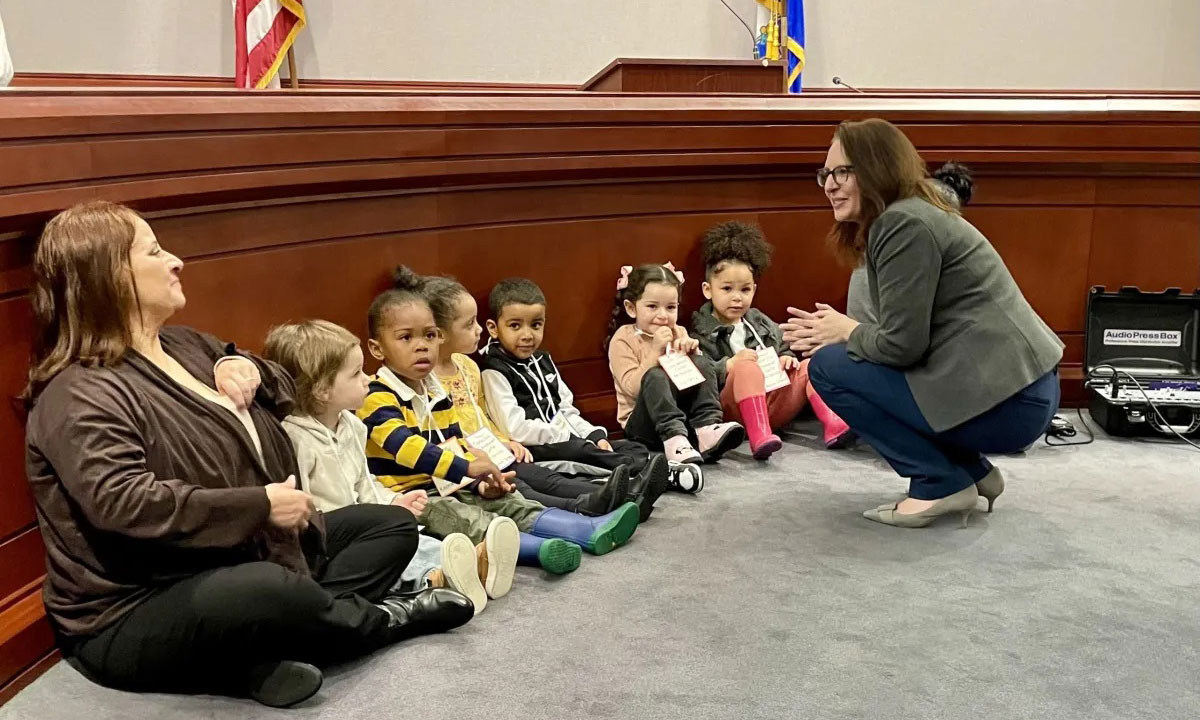Connecticut Lawmakers Want $100M for Child Care ‘Trust Fund’
Modeled after groundbreaking New Mexico initiative, CT fund would allow state to ‘actually do things’ in Blue Ribbon Panel plan.

Get stories like this delivered straight to your inbox. Sign up for The 74 Newsletter
A bipartisan group of Connecticut lawmakers wants to use state money to seed and sustain a trust fund designated solely to cover early childhood education.
The proposal, House Bill 5002, would direct an initial $50 million in bond funding and up to $50 million more from the state’s projected budget surplus this fiscal year into the Early Childhood Care and Education Fund. Private donations, local and federal grants and other public and private contributions could augment the fund, which would be overseen by an advisory commission of state officials, child care industry leaders and representatives from industry and philanthropic organizations, among others.
State Rep. Kate Farrar, D-West Hartford, said H.B. 5002 builds on the recommendations of a Blue Ribbon Panel convened by Gov. Ned Lamont last year, which produced a 5-year strategic plan for the state’s child care system.
“It proposes to transform this work … with public and private investments and create a structure that ensures we have funding now and into the future,” Farrar said at a press conference at the Legislative Office Building in Hartford on Thursday.
But Beth Bye, commissioner of the state’s Office of Early Childhood, raised concerns about the bill — specifically a section calling on the trust fund’s advisory commission to develop a 10-year plan for child care spending and legislative changes to support the system.
“The Blue Ribbon five-year plan provides a vision for Connecticut’s child care infrastructure that will improve access to quality care for thousands of families through efforts aimed at affordability, stabilizing and expanding child care businesses, and improving the quality of programs,” Bye said in written testimony. “The plan was informed by thousands of providers, parents, businesses, and interested residents and evolved significantly. … A new planning process would simply be duplicative of this valuable work.”
Bye also pointed out that an Early Childhood Education Fund already exists, established by the legislature last year, and the fund is permitted to receive philanthropic donations to support early childhood education.
State Comptroller Sean Scanlon, whose office oversees the trust fund, said there is currently no money in that fund. He said he supports the proposal to seed the fund with public money and establish a commission to oversee it. (Scanlon would serve as co-chair of that commission.)
“Part of the rationale for doing this is that wealthy people and foundations don’t just give money to things that have no structure to them and no game plan,” Scanlon said. “The bill does put some seed money into this, but the goal is that both the legislature and private donations would bolster that fund to get to a sufficient point where we could actually do things in the governor’s Blue Ribbon plan that cost a lot of money.”
At the press conference, House Speaker Matt Ritter, D-Hartford, said the trust fund won’t solve Connecticut’s child care crisis right away.
“You have to make down payments,” he said. “You have to make incremental progress by putting more money into that trust fund and growing it.”
Ritter suggested a few ways the state could contribute to the fund on an annual basis: by pledging the interest from the budget reserve fund each year; by designating a portion of any budget surplus; or by agreeing to match private donations up to a certain dollar amount each year.
“There are creative ways to do it, but it’s going to take a little bit of time to work it out,” he said. “We can’t just write a check for $2 trillion and fund it forever in perpetuity, but we can begin to make down payments on it.”
The advisory commission would be tasked with developing those creative solutions.
Later in the day Thursday, Jacob Vigil of New Mexico Voices for Children, a child advocacy and economic policy group, testified before the Finance, Revenue and Bonding Committee about his state’s early childhood trust fund, which was established in 2020. The fund started with $300 million in seed money, and the state designated a portion of surplus oil and gas revenues to sustain the trust fund each year.
“Over the course of, really, a short period of time, the balance of the fund increased dramatically and was estimated by our state legislative economist to sit at over $5 billion dollars going into the 2024 legislative session,” Vigil said.
He called the program “nothing short of generational transformation.”
Committee Co-chair State Sen. John Fonfara, D-Hartford, expressed wariness toward such a large investment of limited state dollars. “We have a tendency, if not a general belief, that by [adding] another program or money that we’re going to be able to address the same challenges,” Fonfara said. “I am not questioning the desire or the commitment but what it will really take to get these children, who need it the most, a shot in life.”
Georgia Goldburn, a former elementary school teacher who now runs child development center Hope for New Haven, stepped up to testify following Fonfara’s comments, and she offered an analogy. Goldburn said if someone was building a house, it wouldn’t be smart to spend only 10% on the construction and keep 90% to fix whatever breaks.
“That is what Connecticut has been doing. That’s why we cannot get the results that we need,” Goldburn said. “Instead of taking 10%, or a minimal amount of money, to build a brain at the most critical time for lifelong learning, we [would be] investing significantly more in these early learning years. So that the remediation that we have to do — in special education or the prison pipeline — all of those things will be deemed moot.
Source New Mexico is part of States Newsroom, a nonprofit news network supported by grants and a coalition of donors as a 501c(3) public charity. Source New Mexico maintains editorial independence. Contact Editor Shaun Griswold for questions: [email protected]. Follow Source New Mexico on Facebook and Twitter.
Get stories like these delivered straight to your inbox. Sign up for The 74 Newsletter

;)
